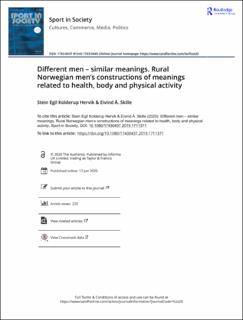Different men – similar meanings. Rural Norwegian men’s constructions of meanings related to health, body and physical activity
Peer reviewed, Journal article
Published version
Permanent lenke
https://hdl.handle.net/11250/2732050Utgivelsesdato
2020Metadata
Vis full innførselSamlinger
Sammendrag
This paper aims to provide an understanding of why a group of middle-aged and elderly rural Norwegian men with heterogeneous backgrounds largely express homogeneous meanings related to health, body and physical activity. Data was generated through 18 in-depth interviews with men of different age, varying ethnicity and with different levels of education. With Bourdieu’s theory of practice and Connell’s theory of hegemonic masculinity as theoretical framework, the discussion focuses on how the construction and expression of these understandings is formed by the context in which the men live their lives and by dominating masculine ideals. We argue that the men’s meanings related to health, body and physical activity are practices through which they accumulate and display several forms of capital – also masculine capital. Not only does the volume of masculine capital a man holds, position him in the social space, it also positions him in the local masculine hierarchy.

